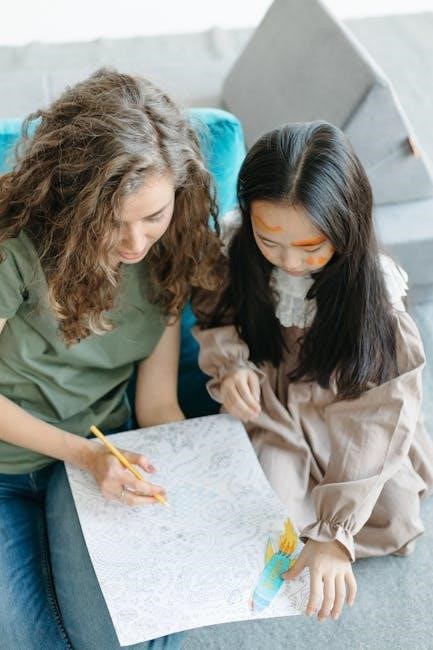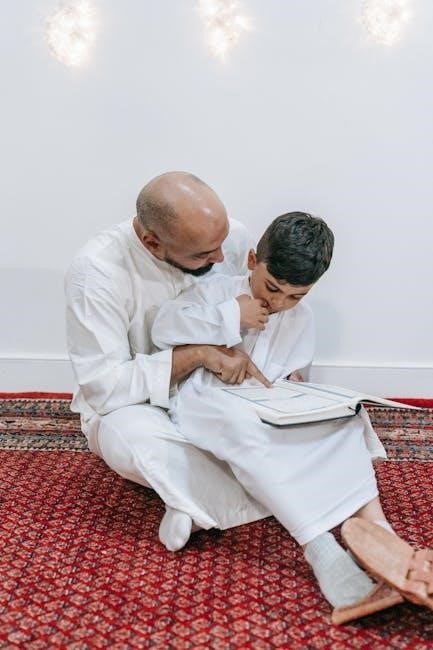This guide empowers parents to effectively prepare their children for interviews, offering practical advice on mindset, attire, and strategies to ensure confidence and success in various settings․
Understanding the Importance of Parental Guidance in Interviews
Parental guidance plays a pivotal role in shaping a child’s interview performance․ By offering support and insights, parents help their children develop confidence, articulate thoughts clearly, and present themselves professionally․ Effective preparation strategies, such as practicing responses and understanding the interview format, are crucial for success․ Parents also foster a positive mindset, encouraging authenticity and resilience․ Their involvement ensures the child is well-prepared, boosting their chances of making a lasting impression․ This guidance not only aids in immediate success but also equips children with lifelong skills for future endeavors․
Setting Realistic Expectations for the Interview Process
Setting realistic expectations helps parents and children approach interviews with clarity and confidence․ While aiming for success, it’s important to understand that interviews can be unpredictable․ Success isn’t solely about the outcome but also about the learning experience․ Parents should guide their children to stay focused on their goals while being prepared for any challenges․ By aligning expectations with the child’s abilities and the interview’s purpose, families can foster resilience and view the process as a valuable growth opportunity, regardless of the result․
Creating a Supportive Environment for Interview Preparation
Creating a supportive environment is crucial for effective interview preparation․ Parents should foster a positive mindset by encouraging open dialogue and providing constructive feedback․ Offer practical resources, such as practice sessions and tips for dressing appropriately․ Encourage your child to ask questions and engage in mock interviews to build confidence․ A calm and reassuring atmosphere helps reduce anxiety, allowing your child to focus on preparation․ By balancing guidance with independence, you empower them to take ownership of their success while feeling supported every step of the way․
Preparing Your Child for the Interview
Help your child excel by guiding them through research, mindset development, and practice․ Foster confidence and readiness through visualization and constructive feedback, ensuring they are well-prepared for success․
Researching the Institution or Company
Encourage your child to thoroughly research the institution or company․ Understanding their values, mission, and culture will help them tailor responses and ask insightful questions․ Discuss their reputation, achievements, and expectations to align with your child’s goals․ This preparation fosters confidence and shows genuine interest, making the interview more engaging and meaningful for both parties․ Guide them to explore official websites, reviews, and news articles to gather comprehensive insights․ This step is crucial for a polished and informed performance․
Helping Your Child Develop a Positive Mindset
Foster a positive mindset in your child by emphasizing effort over perfection․ Encourage them to view the interview as an opportunity to showcase their strengths and learn, rather than a test․ Remind them that it’s okay to make mistakes and that preparation builds confidence․ Celebrate their progress and reinforce that their worth isn’t defined by the outcome․ A growth mindset will help them approach the interview with resilience and optimism, leading to a more authentic and engaging performance․
Encouraging Practice and Rehearsal of Responses
Encourage your child to practice answering potential interview questions regularly․ Create a mock interview setting where they can articulate their thoughts clearly․ Provide constructive feedback to refine their responses without overwhelming them․ Guide them to think through their answers before speaking, ensuring they communicate confidently and concisely․ This rehearsal process helps build familiarity and reduces anxiety, allowing them to present their best self during the actual interview․
Using Visualization Techniques to Build Confidence
Visualization is a powerful tool to boost your child’s confidence․ Encourage them to imagine themselves excelling in the interview, focusing on positive outcomes and calm demeanor․ Guide them to visualize the setting, their body language, and the flow of conversation․ This mental rehearsal helps reduce anxiety and builds self-assurance, enabling them to approach the interview with poise and optimism․ Regular practice of these techniques can significantly enhance their ability to perform well under pressure․

Dressing Appropriately for the Interview
Dress your child in clean, ironed attire that reflects professionalism, ensuring clothes are modest and appropriate for the interview setting to make a positive first impression․
Understanding the Dress Code for Different Types of Interviews
Academic interviews may require formal attire like blazers and ties, while professional settings demand polished outfits․ Casual interviews might allow jeans and neat tops․ Virtual interviews need clean, professional-looking clothing, avoiding bold patterns․ Always research the institution’s dress code to ensure your child fits in and makes a great impression; Dressing appropriately shows respect and readiness, helping your child feel confident and prepared for any interview setting․
Choosing Outfits That Reflect Professionalism
Help your child select high-quality, clean, and well-fitting clothing that reflects professionalism․ Avoid overly casual or flashy items, opting for classic styles and neutral or professional colors․ Ensure the outfit aligns with the interview setting—suits for formal interviews, blazers for semi-formal, and neat separates for casual ones․ Pay attention to details like polished shoes and minimal jewelry․ Research the institution’s or company’s dress code to ensure appropriateness․ Dressing professionally not only makes a positive impression but also boosts your child’s confidence during the interview․
Ensuring Cleanliness and Grooming
A clean and polished appearance is crucial for making a positive impression․ Ensure your child’s hair is neat and styled appropriately, nails are trimmed, and shoes are polished․ Emphasize the importance of personal hygiene, such as using deodorant and brushing teeth; Guide them in selecting minimal, age-appropriate accessories and avoiding flashy jewelry․ For boys, ensure facial hair is well-groomed, and for girls, keep makeup simple and understated․ These details reflect respect for the occasion and contribute to your child’s confidence and professionalism during the interview․

Common Interview Questions and How to Prepare
Help your child anticipate questions about strengths, weaknesses, and goals․ Encourage them to prepare thoughtful answers and practice articulating their experiences clearly with your support․
Understanding Behavioral and Situational Questions
Behavioral and situational questions assess how your child handles real-life scenarios․ Help them prepare by discussing past experiences and hypothetical situations․ Use the STAR method (Situation, Task, Action, Result) to structure responses․ Practice answering questions like, “Tell me about a time you overcame a challenge,” or “How would you handle․․․” Encourage authenticity and provide examples from their life․ This approach helps them showcase problem-solving skills and maturity․ Guide them to stay calm and think clearly during the interview․
Preparing Answers to Personality-Based Questions
Help your child prepare for personality-based questions by identifying key traits like honesty, resilience, or creativity․ Encourage them to share genuine examples from their life․ Teach them to communicate clearly, emphasizing positive qualities․ For instance, if asked, “What are your strengths?” guide them to link it to experiences, such as teamwork or problem-solving․ Remind them to stay authentic and avoid exaggeration․ Role-play scenarios to build confidence in expressing their personality effectively during interviews․
Practicing Responses to Scenario-Based Queries
Engage your child in mock interviews with hypothetical scenarios to refine their problem-solving skills․ Use the STAR method (Situation, Task, Action, Result) to structure responses․ Encourage authenticity and critical thinking, allowing them to reflect on past experiences․ Provide constructive feedback to enhance clarity and confidence․ Tailor practice to the interview type, whether academic or job-related, to ensure relevance․ Teach them to pause briefly before answering, demonstrating thoughtful communication․ Regular practice helps build their ability to handle unexpected situations effectively․
Developing Questions for the Interviewer
Teach your child to ask thoughtful questions during interviews, showcasing their engagement and curiosity․ Encourage them to prepare inquiries about the role, expectations, or future opportunities․ Avoid generic questions and focus on ones that reveal genuine interest, such as asking about challenges or growth prospects․ Help them brainstorm by discussing their goals and what they hope to learn․ This not only impresses interviewers but also aids in making informed decisions, demonstrating maturity and proactive thinking․

Handling Logistics and Scheduling
Ensure your child understands the interview format, whether in-person, virtual, or by phone․ Teach them to confirm details, manage time effectively, and arrive punctually, avoiding last-minute stress․
Understanding the Interview Format (In-Person, Virtual, or Phone)
Help your child differentiate between in-person, virtual, and phone interviews․ In-person requires punctuality and a professional appearance․ Virtual demands a quiet, well-lit space with reliable tech․ Phone interviews rely solely on voice clarity and tone․ Prepare them to adapt to each format, ensuring they understand the unique challenges and opportunities each presents․ This awareness helps in making a strong impression regardless of the setting․
Ensuring Punctuality and Time Management
Teach your child the importance of arriving early to interviews․ Plan the route in advance and consider potential delays․ For virtual interviews, ensure technology is set up beforehand․ Encourage your child to prepare all materials the night before․ Practicing mock interviews can help them understand time allocation for responses․ Emphasize the value of punctuality in making a positive first impression․ Parents can support by creating a structured schedule, fostering a habit of preparedness, and reinforcing the significance of respecting others’ time․ This builds confidence and reduces pre-interview anxiety․
Confirming Interview Details and Requirements
Ensure your child confirms the interview date, time, and location beforehand․ Verify the format—whether in-person, virtual, or phone—and review any specific requirements, such as documents to bring or dress code expectations․ Parents can assist by creating a checklist to avoid last-minute confusion․ Double-checking these details helps reduce anxiety and ensures readiness․ Encourage your child to confirm the interview via email or phone if not already done․ This step ensures clarity and prevents misunderstandings, making the process smoother for everyone involved․
Coaching Your Child Through the Interview Process
Guide your child by role-playing interviews, offering constructive feedback, and fostering a positive mindset․ Encourage authenticity and active listening to build confidence and readiness for success․
Acting as a Sounding Board for Practice Interviews
Being a sounding board allows parents to simulate real interviews, helping their child practice responses and build confidence․ Encourage open dialogue, ask realistic questions, and provide feedback to refine their delivery․ This active involvement ensures they are well-prepared and comfortable articulating their thoughts clearly․ Regular practice sessions can significantly enhance their performance and reduce anxiety, making the actual interview experience less daunting and more manageable․
Providing Constructive Feedback Without Overwhelming
Offering constructive feedback is crucial for improvement without causing stress․ Focus on specific strengths and areas for growth, using positive language to encourage confidence․ Avoid overwhelming your child with excessive criticism; instead, highlight achievements and suggest actionable steps for enhancement․ Balancing praise with guidance fosters a supportive environment, helping them refine their interview skills and build resilience․ This approach ensures they remain motivated and prepared for future opportunities, viewing feedback as a tool for success rather than a source of pressure․
Teaching Active Listening Skills
Active listening is vital for effective communication during interviews․ Encourage your child to focus on the interviewer’s questions, maintaining eye contact and nodding to show engagement․ Teach them to pause briefly before responding, ensuring they fully understand the question․ Role-play scenarios where they practice paraphrasing and asking clarifying questions․ This skill helps them address queries accurately and demonstrate genuine interest, making a positive impression; By fostering attentive listening, you equip your child with a valuable tool for clear and meaningful dialogue during their interviews․
Encouraging Authenticity and Being Oneself
Encourage your child to embrace their true personality during interviews․ Authenticity fosters trust and connection with interviewers․ Guide them to reflect on their genuine interests, strengths, and experiences․ Remind them that it’s okay to be nervous but important to stay true to themselves․ Avoid pressuring them to present a perfect image, as this can lead to discomfort․ Instead, frame the interview as a conversation to showcase their unique qualities․ By being themselves, they create a lasting and honest impression, which is key to long-term success and alignment with the right opportunities․
Handling Nerves and Building Confidence
Help your child manage anxiety with positive affirmations and breathing exercises․ Encourage open conversations about their fears and build confidence through practice and reassurance․
Techniques to Manage Pre-Interview Anxiety
Help your child manage pre-interview nerves with deep breathing exercises and mindfulness techniques․ Encourage positive visualization of the interview and reassure them it’s okay to feel nervous․ Teach grounding methods, like focusing on their surroundings, to calm their mind․ Role-play scenarios to reduce unknown fears and build familiarity․ Remind them to arrive early to ease stress and focus on positive self-talk․ Encourage authenticity, letting them know it’s okay to be themselves during the interview․
Building Self-Esteem Through Positive Affirmations
Positive affirmations can significantly boost your child’s self-esteem before an interview․ Encourage daily affirmations like, “I am capable and confident,” or “I trust in my abilities․” Foster a mindset of self-belief by highlighting their strengths and past achievements․ Remind them that it’s okay to make mistakes and that growth comes from effort․ Celebrate their uniqueness and help them see their value․ By reinforcing positivity, you’ll empower your child to approach interviews with confidence and resilience, focusing on their potential rather than fear of failure․
Teaching Breathing Exercises for Calmness
Teach your child simple breathing exercises to reduce pre-interview nerves․ Inhale deeply through the nose for four counts, hold for four, then exhale slowly for six․ This technique calms the mind and body․ Practice regularly to build a calming habit․ Encourage your child to focus on their breath before and during the interview to stay grounded․ Breathing exercises help manage anxiety, clear the mind, and boost confidence, ensuring they present their best self during the interview process․

Understanding Different Types of Interviews
Understanding different interview types—academic, job, and extracurricular—allows parents to tailor their child’s preparation, addressing unique aspects of each setting for optimal success and confidence․
Academic Interviews (School or College Admissions)
Academic interviews assess a child’s fit and potential for success in a school or college․ Parents should help their child research the institution, practice articulating strengths and experiences, and prepare for common questions about goals and interests․ Encourage visualization techniques to build confidence and review the importance of articulating thoughts clearly․ Emphasize authenticity, ensuring the child presents their genuine self․ Addressing strengths, weaknesses, and future aspirations will help them navigate the interview confidently․ This preparation fosters a positive mindset, equipping them to showcase their abilities and personality effectively․
Job Interviews for Teenagers
Job interviews for teenagers require balance between confidence and professionalism․ Parents should guide their child in researching the company, practicing responses to common questions, and developing a list of thoughtful questions for the interviewer․ Encourage them to speak clearly and confidently, avoiding memorized scripts․ Emphasize the importance of appropriate attire and punctuality․ Discuss the job’s responsibilities and expectations to help them understand the role․ This preparation not only aids in securing the position but also builds essential life skills, teaching them to navigate professional interactions with ease and poise․
Extracurricular or Activity-Based Interviews
Extracurricular interviews focus on showcasing a child’s hobbies, skills, and experiences outside academics․ Parents should guide their child to articulate their passion and specific experiences in these areas․ Encourage them to discuss their favorite activities and how they’ve grown from them․ Authenticity is key; avoid sounding overly rehearsed․ Help them practice responses to common questions and use examples to highlight their skills․ This preparation fosters confidence and a positive mindset, enabling them to present their authentic self effectively in these unique interviews, which often emphasize personal growth and enthusiasm․
Post-Interview Actions
After the interview, discuss the experience with your child, offering constructive feedback․ Guide them in sending thank-you notes and preparing for potential follow-up interviews, ensuring readiness for the next steps in their journey․
Sending Thank-You Notes or Emails
After the interview, guide your child in drafting a heartfelt thank-you note or email to express gratitude for the opportunity․ Highlight key moments from the conversation and reaffirm their interest․ This step not only demonstrates courtesy but also leaves a positive impression․ Encourage your child to personalize the message, reflecting on what they learned or appreciated․ Offer to review the draft, ensuring clarity and professionalism, but avoid writing it for them․ This practice helps build etiquette and reinforces the importance of follow-through in their journey․
Reviewing the Interview Experience
After the interview, engage your child in a reflective discussion about their experience․ Discuss what went well and areas for improvement, fostering a growth mindset․ Encourage them to share their feelings and insights, helping them identify strengths and opportunities to grow․ Documenting feedback and key takeaways can provide valuable insights for future interviews․ This step reinforces learning and prepares them for ongoing success in their endeavors, ensuring they feel supported and guided every step of the way․
Preparing for Potential Follow-Up Interviews
After the initial interview, parents should help their child prepare for potential follow-ups by reviewing possible questions and refining responses․ Encourage sending thank-you notes to express gratitude and maintain communication․ Stay informed about the institution or company to address new topics confidently․ Practice mock interviews to build confidence and address areas of improvement․ Ensure your child is well-rested and organized with necessary documents․ Follow-up interviews are opportunities to showcase growth and enthusiasm, making thorough preparation essential for a positive impression and continued success․
Additional Resources and Support
Explore recommended books like “Success At School And Beyond” and online guides offering tips for interview preparation․ Utilize professional coaching services and join parent support forums for additional guidance and strategies․
Recommended Reading and Online Guides
Discover essential resources like “Success At School And Beyond” and online platforms offering evidence-based strategies to help parents guide their children through interviews․ These guides provide practical tips on building confidence, practicing responses, and understanding interview formats․ They also cover topics like appropriate attire and common questions, ensuring a holistic approach to preparation․ Utilize professional coaching services and online forums for additional support, empowering your child to excel in academic, job, or extracurricular interviews with confidence and poise․
Professional Coaching Services for Interviews
Professional coaching services offer tailored strategies to prepare children for interviews, enhancing their confidence and communication skills․ These services often include mock interviews, personalized feedback, and techniques to handle nerves․ Coaches specialize in various interview types, such as academic or job interviews, ensuring a focused approach․ Many parents invest in these services to give their children a competitive edge, particularly for competitive admissions or job placements․ Coaching not only improves performance but also instills long-term skills for future opportunities, making it a valuable investment in their development․
Support Groups or Forums for Parents
Support groups and online forums provide a platform for parents to share experiences, tips, and resources․ These communities foster collaboration, offering insights into interview preparation and strategies․ Parents can access advice on common challenges, such as managing nerves or crafting impactful responses․ Forums often feature expert guidance, real-life success stories, and practical tools․ Engaging with these groups helps parents feel supported and informed, ensuring they can effectively guide their children through the interview process with confidence and clarity․
